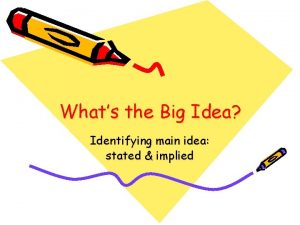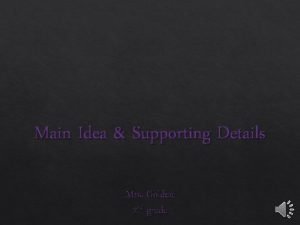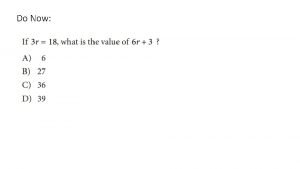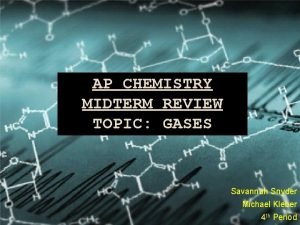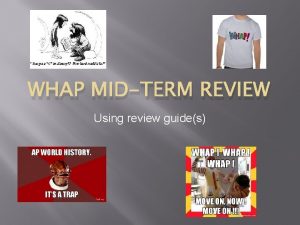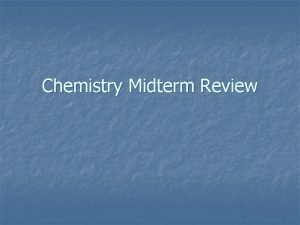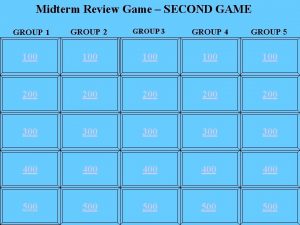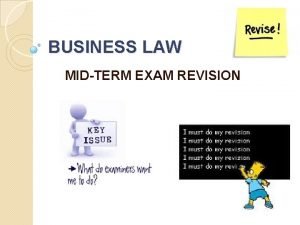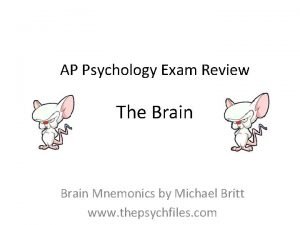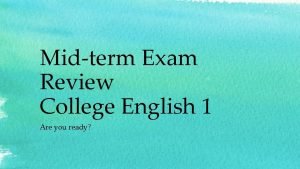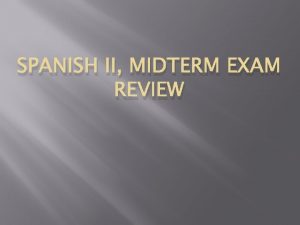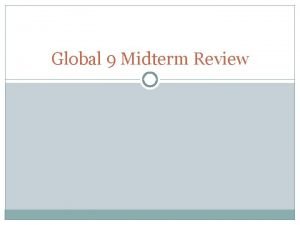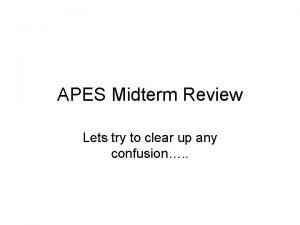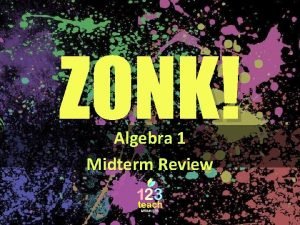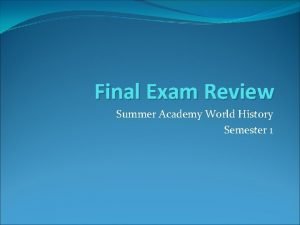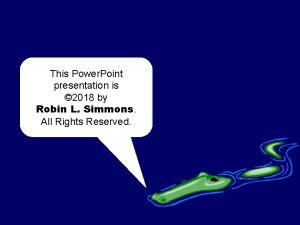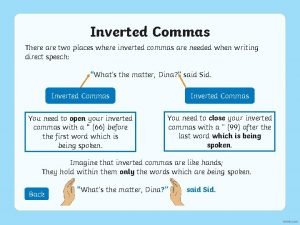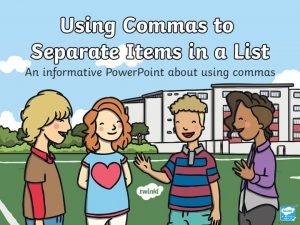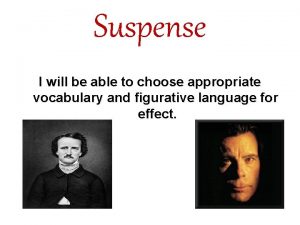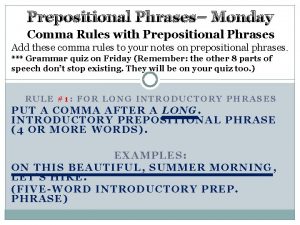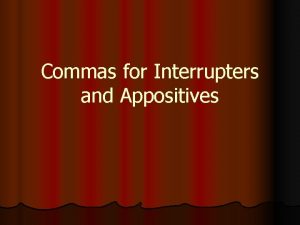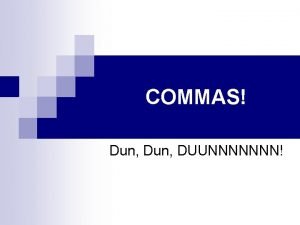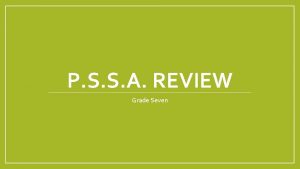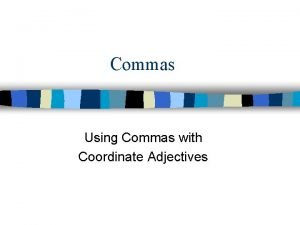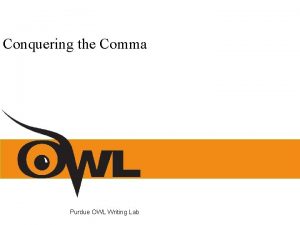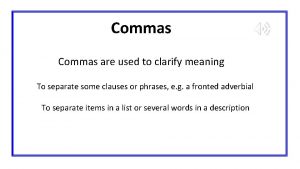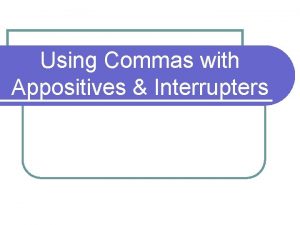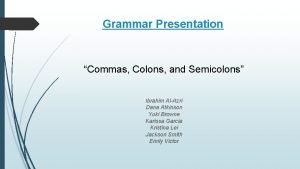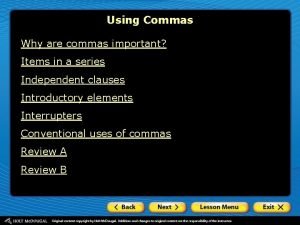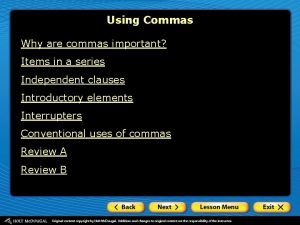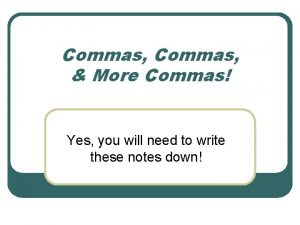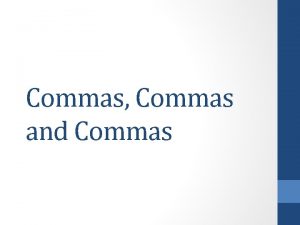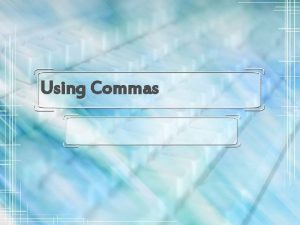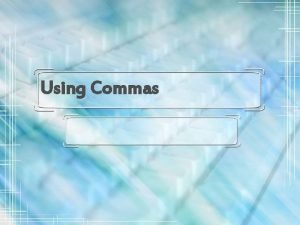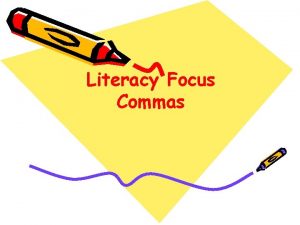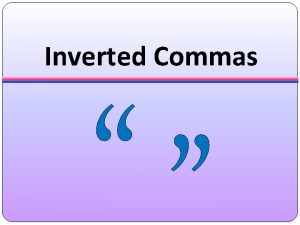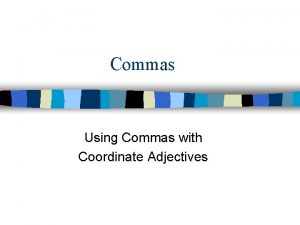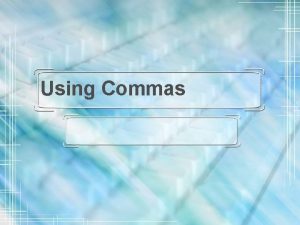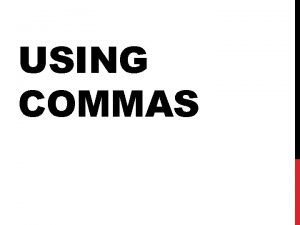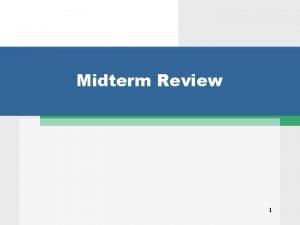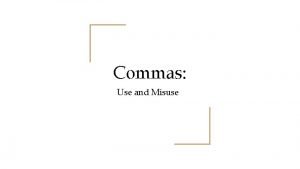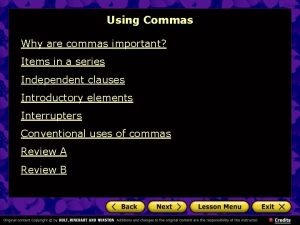Midterm Review AH Eng II Commas 1 Soccer







































- Slides: 39

Midterm Review AH Eng II

Commas • 1. Soccer, or futbol in Hispanic countries, is a worldwide sport. • 2. Bill Clinton, served as President, and is married to Hillary Clinton. • 3. Tianna, desiring to travel, decided to book a trip to Paris. • 4. Pokemon Go, which had a huge launch success, is slowly starting to lose its popularity. • In the above choices, which one shows INCORRECT comma usage?


Commas • 1. My son can take you to the mall in the new car but he has to finish his chores first. • A. My son can take you, to the mall, in the new car, but he has to finish his chores first. • B. My son can take you to the mall, in the new car, but he has to finish his chores first. • C. My son can take you to the mall in the new car, but he has to finish his chores first. • D. No change


Parallelism • She tried to sit through the movie and feign enjoyment, but she was distracted by the text messages she was receiving. So she excused herself, crawled through the aisles, and _____. a. started running towards the exit b. ran towards the exit c. she decided to run towards the exit d. running towards the exit, she threw her phone.


Transitions • I cleaned the house for hours; ________, I hoped it would convince my parents to let me go to the party. • A. On the other hand • B. Similarly • C. For instance • D. Furthermore


Narrative/Informational/Argumentative • Narrative writing tells a story • Informational writing gives facts and teaches the reader new information (research report, how-to article, directions) • Argumentative writing is persuasive and is intended to convince the reader to act, feel, or do something

Examine the introductions. Which is which? • The prompt: What is the largest contributing factor of stress in your life? • A. Many teens in the U. S. face stress that seems to be dismissed with contempt. It seems that many assume that all teens in the U. S. are privileged, and should not complain because we are not a third-world country. However, the stress and anxiety teens feel here should not be shrugged off and belittled as many are suffering silently with depression. It is important for everyone to start taking this matter more seriously. • -persuasive, informative, or narrative?

Examine the introductions. Which is which? • The prompt: What is the largest contributing factor of stress in your life? • A. I have several stress factors in my life. School, obviously, is a large stressor: taking tests, writing papers, completing homework, and dealing with social cliques. Another factor of stress in my life is trying to maintain a balance in my family. Since I am the eldest child, I have to be the one to set a positive example and take care of my siblings. Furthermore, my parents expect me to also take the lead in cleaning and cooking as well. • -persuasive, informative, or narrative?

Examine the introductions. Which is which? • The prompt: What is the largest contributing factor of stress in your life? • A. Beep! I slam my fist on the alarm to shut it off so I would not wake everyone up in my house. I have to get up earlier than everyone else, as I am expected to get breakfast ready for my siblings. Furthermore, I also have to finish my homework that I couldn’t finish last night because I had to help my little sister study for her test. I tip-toe quietly into the bathroom, and try to adjust to the blinding florescent light. • -persuasive, informative, or narrative?

Concluding paragraphs • Should begin with a restated thesis • Should NEVER have new information • Should restate all your main points and ideas again

Vivid Words • Be able to identify sentences that use the most vivid imagery. Consider the verbs. For example, is it more vivid to say ran or galloped? • She tried to cool her food by blowing on it. She tried to cool her food by fanning it. • Is it more vivid to say blowing or fanning?

• fanning

Semicolons – Which is correct? a. Go into any school; where students know they are expected to be in class by the tardy bell. b. Turn on the radio; and you’ll hear an advertisement on every station. c. We have a lot of school spirit and pride; in fact, you will see a large turnout at every sports event. d. The history of our nation is very sad, riddled with bloody conquests; acts of horror, and unspeakable crimes against humanity.


Punctuation – Which is correct? a. When Jakobi packed for his trip, he knew he would need: sweat pants, more sweat pants, and maybe a pair of jeans. b. Brandon knew exactly what he would need for his first day at school: a pencil, some paper, and a small bat to hit people with that got on his nerves. c. As soon as she got home, Adrienne threw everything down by the door, her backpack, her shoes, and her jacket. d. Raquel already started dreaming of summer and decided that she would; sleep in past noon, go swimming with her friends, and plan a trip with her family.


Cause and effect • What is cause and effect? How would you define this?

Pronoun-Antecedent Agreement a. Either the students or the teacher would have to be willing to change their/his attitude. a. TIP: When you have both singular and plural, you go with the one CLOSER to the pronoun b. The team made their/its decision. a. Remember the cheat sheet? c. The door and the window showed their/its age. a. TIP: when you see “and” is it plural or singular? d. Neither the child nor the parents were willing to change his/their attitude.

• A. his • B. its • C. their • D. their

Context Clues & vocabulary • When you see an unknown word, make sure you pay attention to the sentences surrounding the sentence in which it is used in. Usually, it can be defined by context clues and surrounding sentences that end up defining the unknown word.

Word Wall • • • Abyss Façade Objectivity Penance Feign Disperse Discourse Divert Gorge Prattle Objectivity

Commonly Confused Words • Accept vs. Except • To, Too, Two • There, Their, They’re • Site, Cite, Sight • Shone, Shown • Aloud vs. Allowed

Prefixes • Hyper • Hypo • Inter • Un • Mono

Connotation vs. Denotation • What is the connotative meaning of a word? • What is the denotative meaning of a word?

Pathos, Ethos, Logos • Pathos appeals to emotion. • Ethos appeals to ethics and credibility in a person’s character. • Logos appeals to logic.

The following slide contains terms • Know the following terms and how to identify them in a passage.

• Blank verse – a verse without rhyme. Shakespeare often wrote blank verses with iambic pentameter • Dialogue – Spoken aloud, minimum of 2 people talking • Soliloquy – a character alone on stage speaking their thoughts out loud for the audience • Aside – a comment given off to the side and we are to pretend that the other characters on stage cannot hear this comment • Pun – a play on words. “Sole and Soul” - AKA verbal humor • Verbal irony – when something is said but not meant, like sarcasm • Situational irony – when what happens is not expected. A fireman’s house catches on fire. • Dramatic irony – when the audience knows something that the characters on stage do not • Inversion - normal order of words is reversed in order to achieve a particular effect of emphasis or meter. • Paradox - self-contradictory or a logically unacceptable conclusion. “We cannot hire you because you don’t have experience…. (but I can’t get experience if no one hires me? !) • Understatement - deliberately makes a situation seem less important or serious than it is. Restraint or lack of emphasis in expression for rhetorical effect. • Central Idea – Know how to identify the central idea, or the main idea, in a excerpt.

Fact vs. Opinion • School is a very stressful environment. • School is a valuable personal investment. • School is a building where people go to receive an education. • School is guaranteed to equip you with knowledge and education you will need and use.

Concluding sentences • When writing, it is always to end your paragraph by referring back to your topic sentence in some way. • Think like this: When you write an essay, you have your main idea/thesis statement in the intro. In your conclusion, you remind your reader of this by restating it. • In a paragraph, when you end your paragraph you should refer back to the main idea/topic sentence/thesis. This reminds your reader why they were reading the paragraph to begin with.

Thesis statements • (3 points for your body) • Strong thesis statements inform the reader what your main idea for your writing is. • Strong thesis statements include the main points that your body paragraphs will be centered around. • Strong thesis statements will be precise and clear.

Source 1 vs Source 2 • When we researched our topics for our essays, we came across more than one source to get information for our writing. • Be able to examine two sources on the same topic, and analyze how they are similar. Be able to pick an option that shows the similarity between the two sources. • Be able to identify what one source is useful for, and what the other source would be useful for.

What requires a citation? • Direct quotes • Statistics • Research that is not common knowledge

Pronoun consistency • (1) One would think that people would be considerate and treat others with respect. (2) Instead, they are always selfish and inconsiderate of you. (3) Thoughtfulness, if present at all, may never really be shown to an individual. (4) Other people may be careless, making it hard for another person to determine if they really care. • Which sentence revision would make this paragraph have point of view consistency? • A. You would think that people would be considerate and treat others with respect. • B. Instead, they are always selfish and inconsiderate of another individual. • C. Thoughtfulness, if present at all, may never really by shown to you. • D. Other people may be careless, making it hard for me to determine if they really care.


Logical Fallacies – Know these and how to identify them in an example. • Slippery slope – false assumption that one thing must lead to another • Appeal to authority – using an authority as evidence in an argument when the authority is not really an authority on the facts relevant to the argument • Ad hominem – attacking a person’s character or motivations rather than a position or argument • Straw man – exaggerating, misrepresenting, or just completely fabricating someone’s argument, it’s much easier to present your own position as being reasonable
 Funksiyaning eng kichik qiymati
Funksiyaning eng kichik qiymati Whats a main idea
Whats a main idea Soccer players learn many skills when playing soccer
Soccer players learn many skills when playing soccer Trig midterm review
Trig midterm review Ap chemistry midterm review
Ap chemistry midterm review Whap midterm review
Whap midterm review Biology midterm review
Biology midterm review Chemistry midterm review
Chemistry midterm review Algebra 2 midterm study guide
Algebra 2 midterm study guide When backed by buying power wants become
When backed by buying power wants become Geometry midterm exam
Geometry midterm exam Business law midterm review
Business law midterm review Michael britt brain mnemonics
Michael britt brain mnemonics College english midterm exam
College english midterm exam Spanish 2 midterm review
Spanish 2 midterm review Global 9 midterm review
Global 9 midterm review Apes midterm exam
Apes midterm exam Algebra 1 midterm review
Algebra 1 midterm review World history regular semester 1 review
World history regular semester 1 review Commas with and
Commas with and Why are inverted commas used
Why are inverted commas used Chomp chomp apostrophes
Chomp chomp apostrophes Comma looks like
Comma looks like Inverted commas
Inverted commas Comma after preposition
Comma after preposition Commas for interrupters
Commas for interrupters Arithmetic sequence meaning
Arithmetic sequence meaning Commas to separate adjectives
Commas to separate adjectives Which sentence uses commas correctly the former astronaut
Which sentence uses commas correctly the former astronaut Coordinate adjectives comma
Coordinate adjectives comma Purdue owl comma rules
Purdue owl comma rules 3 commas in a circle
3 commas in a circle Using commas to separate clauses
Using commas to separate clauses Interrupter examples
Interrupter examples Commas separating independent clauses
Commas separating independent clauses Practice with commas we are having peas
Practice with commas we are having peas Why are commas important
Why are commas important Such as comma
Such as comma Commas that set off added elements
Commas that set off added elements Relative clause definition
Relative clause definition

